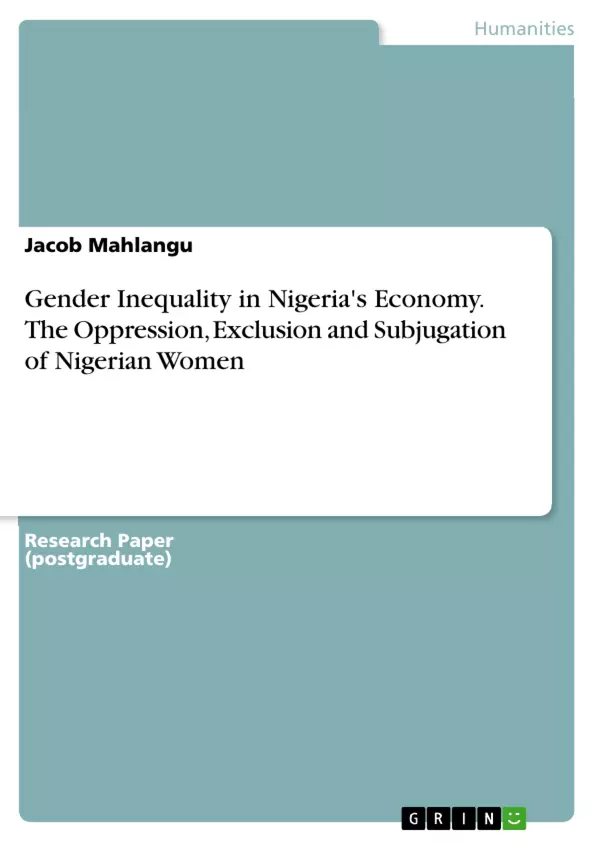This study explores the indicators that outline the oppression, exclusion and subjugation of Nigerian women in the contemporary world. The study analyses the impacts such as the Nigerian laws, the notion that Nigeria retains a patriarchal social structure, Nigerian politics, and of course most importantly, Nigeria’s economy. The study employs the theoretical framework of the "Black Feminist Theory", which in a nutshell can be described as a sociopolitical and economic perspective that acknowledges the perpetuation of the dominance of Patriarchy in the 21st Century; it is a critical theory, advocating for the dismantling of gender bias categorizations and dichotomies that attribute females with inferior qualities as opposed to their male counterparts. This theory is suitable for the study as it provides a lens with which to analyse and frame the research within a specific boundary that can be managed with relevant discourse; the theoretical framework assists the study with a useful vocabulary to unpack the phenomenon it wishes to investigate.
The study is an extended literature review, sourcing information from online journal articles, library, online articles from organizations, archives, and newsletters; therefore the article is heavily reliant on secondary accessible data. The study employs a qualitative research design, as it deals with unpacking concepts, exploring experiences of individuals in a social environment and dealing with data that is subject to interpretation.
Table of Contents
- Introduction
- Theoretical Framework
- Research Design
- Methodology
- Critical Literature Review
- Discussion
Objectives and Key Themes
This research explores the economic challenges faced by women in Nigeria, focusing on their entrepreneurial endeavors and the obstacles they encounter in achieving economic empowerment. The study aims to shed light on the factors hindering women's participation in the Nigerian economy, particularly in sectors offering substantial income potential.
- The impact of gender inequality on women's economic participation in Nigeria
- The role of patriarchal structures and cultural norms in perpetuating economic disparities between genders
- The influence of discriminatory laws and policies on women's access to resources, education, and opportunities
- The effectiveness of governmental and intergovernmental initiatives in addressing gender inequality in the Nigerian economy
- The importance of fostering inclusive economic growth and promoting women's entrepreneurship to achieve sustainable development in Nigeria
Chapter Summaries
- Introduction: The chapter introduces the issue of gender inequality in Nigeria's economy, highlighting the global importance of gender equality and the specific challenges faced by women in developing countries. It uses Nigeria as a case study, emphasizing the barriers hindering women's economic prosperity, including their exclusion from investment opportunities and the dominance of men in key economic sectors.
- Theoretical Framework: The chapter delves into the Black Feminist theory, a theoretical framework used to analyze the research topic. The theory emphasizes the historical and contemporary oppression of women within patriarchal systems and advocates for dismantling gender biases and achieving equality in all aspects of society, particularly in the workplace.
- Research Design: This chapter outlines the research methodology used in the study, which relies on a qualitative approach and an extended literature review. It explains the rationale for the research, the main objectives, and the research questions that guide the investigation.
- Critical Literature Review: This chapter presents a comprehensive review of existing literature on gender inequality in Nigeria's economy. It draws on secondary data from various sources to support the study's central argument about the phenomenon of gender inequality and its implications for women's economic empowerment.
Keywords
The key terms and concepts explored in this research include: gender inequality, economic empowerment, Nigerian economy, entrepreneurship, women's participation in the workforce, patriarchal structures, Black Feminist theory, discriminatory laws, policy recommendations, sustainable development, and foreign direct investment.
- Quote paper
- Jacob Mahlangu (Author), 2023, Gender Inequality in Nigeria's Economy. The Oppression, Exclusion and Subjugation of Nigerian Women, Munich, GRIN Verlag, https://www.grin.com/document/1381467




